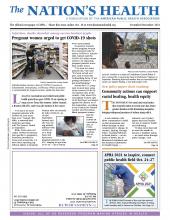Black women face high maternal deaths
Racial disparities in the U.S. maternal death rate, particularly for Black women, remain a critical public health issue, a study in APHA’s September American Journal of Public Health finds.
Using 2016-2017 National Vital Statistics System data, researchers found that the maternal mortality rate among Black women was over three times that for white women. Leading causes of death among Black women were eclampsia and preeclampsia, as well as postpartum cardiomyopathy. Rates of the conditions were five times higher than for white women. Black maternal mortality rates from obstetric embolism and obstetric hemorrhage were 2.6 times higher than for white women.
Researchers defined maternal mortality as death during pregnancy or 42 days afterward that was causally related to the pregnancy.
“These finding are especially concerning because the majority of deaths from these causes are preventable,” the researchers said.
Pandemic harms LGBTQ+ people
Lesbian, gay, bisexual, transgender and queer communities have experienced worse mental health during the COVID-19 pandemic than their straight counterparts, a study in September’s AJPH finds.
Researchers used data gathered from the Uncovering COVID-19 Experiences and Realities study in May and July 2020. More than 3,200 adults in Atlanta, Chicago, New Orleans, New York and Los Angeles took part in the study.
LGBTQ+ people self-reported higher levels of depression, anxiety and excessive drinking during the pandemic, and were more likely to have an increase in mental health issues overall. People who identified as bisexual reported the highest levels of depression and anxiety.
“It is essential that providers get the necessary training to provide affirming and supportive care for (the LGBTQ+) population during the pandemic,” the study authors said.
Barriers to abortion increase death risks
State policies that make it harder to access abortion services can increase the risk of maternal death, according to new findings in the September issue of AJPH.
To conduct the study, researchers developed an abortion policy composite index for each state based on eight state-level abortion restrictions, such as mandatory waiting periods and counseling, and used models to estimate the effect on maternal mortality. They found that states with higher index scores had a 7% increase in total maternal mortality, defined as a death during pregnancy or within one year after that is causally related.
States with restrictions on Medicaid coverage of abortion care had a 29% higher maternal mortality rate. States with a licensed physician requirement, which requires a physician rather than nurse or nurse midwife to perform the abortion, had a 51% higher maternal mortality rate, probably because of decreased access, researchers said.
Drug treatment impacts newborns
Using medication to treat opioid use disorder during pregnancy can lead to withdrawal in newborns, but the condition is treatable, according to a study in September’s AJPH.
Researchers analyzed data on births and maternal Medicaid claims in North Carolina between 2016 and 2018. They found that among mothers of infants with neonatal opioid withdrawal syndrome, over 38% used medication to treat an opioid use disorder. About 14% were taking prescription opioids and about 8% were taking both.
When compared to outcomes from detoxification and continued opioid use, taking an opioid use disorder medication during pregnancy increased odds a woman would not use opioids and that a baby be born at a healthy birthweight. Though infant opioid withdrawal syndrome can result, symptoms are generally mild, such as high-pitched crying, and treatable.
“By highlighting the use of treatment and opioids as prescribed by a health care provider among mothers of infants with (neonatal opioid withdrawal syndrome), these results provide insights for intervention and can be used to reduce stigma,” the researchers said.
For studies and podcasts from AJPH, visit www.ajph.org.
- Copyright The Nation’s Health, American Public Health Association









